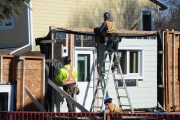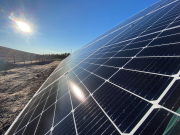The sights of the twin earthquake and tsunami disasters in the Tohoku region of Japan have been unforgettable. Like so many, I have watched the videos that have emerged with a mixture of despair and morbid fascination, the latter feeling triggered by images of the sea at its most powerful and destructive. In an age when technology seems to offer us humans mastery over our natural environments, the sight of a tsunami wave literally swallowing a town whole is a troubling reminder that we can be as subject to the whims and fancies of the Earth as the next species.
While the tragedy of these natural disasters and discussions of the colossal effort required to reconstruct (or 復興 in Japanese, literally "restore and revive") initially dominated headlines, the unfolding Fukushima nuclear crisis quickly elbowed its way to centrestage.
A nuclear crisis unfolding
The spectre of one or more of the reactors releasing large and prolonged amounts of radiation plays on our fears in the same way that the earthquake and tsunami do, in that if it happens we don't control the full consequences — nature does.According to media reports, Japanese authorities recently increased the severity of the crisis to five out of seven, recognizing severe damage to a reactor core, the release of large quantities of radioactive material within an installation, and a high probability of significant public exposure. The situation at the Fukushima Daiichi plant now parallels the American Three Mile Island disaster in the 1970s. Workers at the nuclear plant continue to put their health and lives at serious risk in a frantic battle to keep damaged reactors and spent fuel rods cool to avoid a full-scale meltdown.
The spectre of one or more of the reactors releasing large and prolonged amounts of radiation plays on our fears in the same way that the earthquake and tsunami do, in that if it happens we don't control the full consequences — nature does.
I don't want to heap scorn on misery by second-guessing Japan's reasons for developing nuclear power decades ago. As the only country that has suffered a nuclear bomb attack, Japan's energy planners at the time did not decide to build nuclear power plants blithely, nor were they lax in their risk management planning. On the contrary — I have often marveled at how seriously Japan takes emergency preparedness, without which the casualty rate from the Tohoku earthquake and tsunami would have been far, far greater.
Yet as we watch the drama unfold, we would be reckless not to consider the implications of Japan's nuclear crisis for our own energy system.
Lessons for Canadian decisionmakers
We don't need nuclear in Canada to get to low-carbon power, so even a low-probability risk isn't worth it, as we watch in real-time what the magnitude of that risk can be. Canadian energy planners and politicians, particularly those in Ontario who are pushing for a nuclear renaissance, must draw lessons from the Fukushima nuclear crisis. In short: we should be planning to phase out nuclear power, not aid its rebirth.
The Fukushima crisis is a reminder of nuclear power's inherent risks, which remain despite even the most sophisticated emergency preparedness and planning. Separate from safety concerns, the economic case against nuclear is strong. Nuclear power is extremely capital-intensive relative to other sources of power, it takes over a decade to get a plant built, and its output is very inflexible — meaning that nuclear power plants are not able to follow the ups and downs of the electricity system demands, and as a result they pose challenges to the integration of increasing amounts of energy from renewable sources. Nuclear plants come in huge units, so units go down for repairs and maintenance, big blocks of power are off line and that power has to be made up for from somewhere else, which can be a big problem when repairs go over schedule and budget as has been very common in Canada. Meanwhile, disposal of nuclear waste remains an intractable problem.
All this, before you factor in safety and liability issues. The federal government's Nuclear Liability Act limits financial liability of any nuclear reactor operator to $75 million. Stephen Harper is proposing this be raised to $650 billion, but it is unclear how far that would go toward properly compensating for damage were a plant near Toronto to emit high levels of radiation.
Linda Keen, who was president of the Canadian Nuclear Safety Commission from 2001 to 2007, said with respect to the Pickering nuclear plant, "Population growth means the risk has increased.... To be honest, I don't know how you'd vacate the Pickering area alone in the event of an emergency." Were evacuation in the area feasible, it seems Keen of all people would know.
"Population growth means the risk has increased.... To be honest, I don't know how you'd vacate the Pickering area alone in the event of an emergency."
— Linda Keen, former president of the Canadian Nuclear Safety CommissionNow, I don't mean to be alarmist. Proponents of nuclear in Canada argue that our plants aren't susceptible to earthquakes, and that nuclear is a better alternative to high greenhouse gas-emitting coal-fired electricity. While the risk of earthquakes here is indeed low, there are still other risks, and first among them in my mind is the possibility of a terrorist strike against a nuclear facility. Should we accept a risk profile that may be low probability, but highly catastrophic?
Weighing the benefits against the risks
It could depend on the benefits — including how important nuclear is to our efforts to fight climate change. David Keith, one of Canada's pre-eminent thinkers on climate change solutions, argues that we have a few big "hammers" to reduce greenhouse gas emissions from energy production: nuclear, wind power and carbon capture and storage (CCS). He suggests that while you can be against one of them, you can't be against all three and still be serious about tackling climate change in the very near term. Pembina agrees — we're pro-CCS, but at the same time we see greater value in concentrating on using energy efficiently and investing in renewable energy sources, including wind, that cost less than nuclear.
And we're not alone in that view. Shell reports that the wind industry grew by 28 per cent per year between 2003 and 2009, and 2010 was a record year for renewable energy in general, with $243 billion invested globally. Meanwhile nuclear has been in sharp decline since Chernobyl. The market is clearly making up its mind on the low-carbon electricity question.
All energy systems have trade-offs, and there are downsides to wind, biomass and solar as well. The question we need to be asking is this: are the risks associated with nuclear acceptable, when other viable options exist?
Canadian nuclear under scrutiny
We can expect that question to be front and centre in Ontario in the coming weeks, as public hearings are due to start on Monday on the proposal to build new reactors at the Darlington nuclear station. It's a critical time to reconsider the role nuclear power plays in the province, and the willingness of Ontarians to carry the risks — financial and otherwise — when the province has an abundance of less expensive and lower-risk energy alternatives available, and has recently established itself as a national leader in developing those alternatives.
The bottom line is we don't need nuclear in Canada to get to low-carbon power, so even a low-probability risk isn't worth it, as we watch in real-time what the magnitude of that risk can be.
Japan's crisis hits close to home
Though these events are happening far away in Japan, they still hit close to my home. My wife Yuka is Japanese, and we are raising our two kids in a bi-cultural environment. Fortunately, Yuka's immediate family members — including her brother in Tokyo and mum and sister near Nagoya — were untouched by the earthquake and tsunami. While a cousin who is a medical doctor was working at a hospital in Sendai when the quake struck, he luckily was unhurt, though his house suffered damage.
I also have many Japanese friends, from the years that I worked and studied in Japan and from being an active part of Banff's Japanese community, which accounts for about 10 per cent of the town's permanent population. My household and many others in town have gone through a kind of suspended animation as we try to pull together a valley-wide fundraiser for relief work tomorrow. While it seems like a token gesture compared to the magnitude of the disaster, helping out in some way is emotionally so important for this community.
My brother-in-law in Tokyo wrote on Wednesday that he's experiencing "social unease" for the first time in his near-50 years as a result of the Fukushima crisis. We can make intelligent energy choices today so that no one else has to experience the same unease, or outright suffering, in the future. Let's also do everything we can to help out our Japanese friends in their time of great need.








